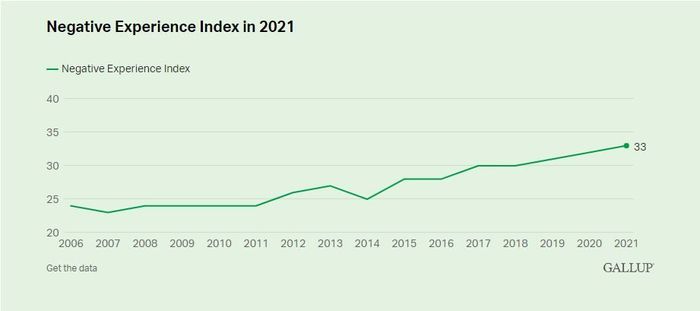Emotionally, the slog of the second year of COVID-19 proved as distressing as the shock of the first.
As 2021 served up a steady diet of uncertainty, including from the pandemic, the world became a slightly sadder, more worried and more stressed-out place than it was the year before. That pushed the annual Gallup’s Negative Experience Index to a record high of 33 last year, a report issued Tuesday showed.

Global respondents to well-known survey source Gallup have felt their negative moods rising for the past several years, hitting another record in 2021.
Gallup
As it does every year, Gallup tapped adults in 122 countries for its global-wide mood poll. The survey, by design, forces respondents to share a narrow snapshot of their negative and positive experiences; they’re asked with five questions how they felt the day before.
Four in 10 adults worldwide said they experienced a lot of worry (42%) or stress (41%), and slightly more than three in 10 experienced a lot of physical pain (31%). More than one in four experienced sadness (28%), and slightly fewer experienced anger (23%).
Read: ‘This isn’t just gonna go away’: Long COVID is crashing the retirement hopes of many Americans
And what about 2022? Ukraine, inflation, Roe
Since the annual poll covers 2021, questions did not dig into 2022’s headlines, another intense handful of developments that for some is likely to add to the stress on individual happiness and relationships. The list includes Russia’s unprovoked attack on Ukraine at the start of the year and the plight for war-driven refugees, as well as that war’s impact on surging energy costs
BRN00,
for many people already feeling the pinch of higher food costs.
Read: Consumer confidence falls to 16-month low on worries about inflation and economy
The world over, inflation talk is dividing economists and roiling the stock market
SPX,
and many retirement plans. Recession worries are mounting as well.
Women, in particular, have felt the strains of needing childcare flexibility around COVID-19, and since, especially with costs rising. Women, research has found, feel the strain of inflation and budget juggling more than most men.
In the U.S. alone, divisive issues continue to populate the discussion leading up to this year’s midterm elections, starting with this month’s reversal of decades-old abortion-rights policies, a decision that can impact 40 million U.S. women, and an indication from the conservative-majority Supreme Court that contraception and same-sex marriage could be next.
The high court is also likely to rule on a pollution measure that opponents and proponents alike think could deal a sharp blow to President Biden’s climate-change efforts, even as the U.N. and other major bodies say the clock is ticking on such action and that the U.S. needs to lead. Climate change is among the issues that many young people say impacts their plans for the future, including having children.
As for Gallup’s snapshot of 2021, the percentage of adults worldwide who said they experienced pain also rebounded two percentage points, matching levels more in line with previous years’ estimates.
Have we actually grown less angry?
The Gallup findings did produce one significant bright spot: Reports of anger did not increase in 2021, dropping a single point from 24% in 2020. Empathy for COVID-19 suffering and for some, renewed patience as life slowed down likely cooled quick-trigger flareups.
The poll also flips the overriding question, asking respondents about positive feelings the day before the survey. But just as the negative barometer rose, this measure fell.
On top of the increase in negative experiences, fewer people reported that they had positive experiences the previous day. After several years of stability, the Positive Experience Index score in 2021 — at a reading of 69 — dropped for the first time since 2017.
With more people dying from the coronavirus in 2021 than the previous year despite the rollout of vaccines, people felt less well-rested, and fewer derived enjoyment from the previous day.
Last year, roughly seven in 10 people worldwide said they felt well-rested (69%), experienced a lot of enjoyment (70%), or smiled or laughed a lot (72%), Gallup said. Nearly nine in 10 felt treated with respect (86%). People were far less likely, as they are typically, to say they learned or did something interesting the day before the interview; in 2021, half of the world (50%) experienced this.
However, the picture wasn’t entirely bleak. People were starting to smile and laugh again — the percentage who laughed or smiled a lot increased two points — and the percentage who learned something interesting ticked up one point.
The lesson in that finding is pretty clear. When the world feels like it is crumbling, unearthing joy in small gestures, allowing yourself to be open to laughter and nurturing your curiosity can go a long way.



